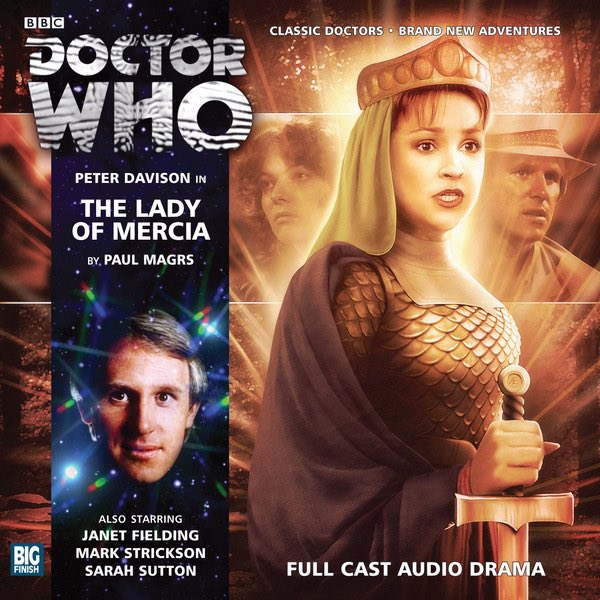
Following from 2013's Lady of Mercia, a Fifth Doctor audio that barely featured Nyssa, the also 2013 audio play Prisoners of Fate is all about Nyssa. Writer Jonathan Morris satisfyingly ties together several plot elements that had accumulated for the lady from Traken over the course of a variety of audio plays, offering some resolutions along with a starting point for some new ideas in a nice time paradox puzzle story.
When Janet Fielding came back to play Tegan, the makers of the audio plays naturally wanted to assemble the Fifth Doctor's (Peter Davision) best team of companions--Nyssa (Sarah Sutton), Tegan, and Turlough (Mark Strickson). The trouble was, any story featuring Turlough before Enlightenment had to include the subplot about him being in league with the Black Guardian, a story arc from Five's second season, and Nyssa had left the show in the story previous to Enlightenment. So in the audio Cobwebs, Nyssa was reunited with the Doctor, Tegan, and Turlough after the events of Enlightenment. The makers of the audios also took the opportunity to age up Nyssa to something close to Sarah Sutton's actual age, featuring her decades later in the process of trying to find a cure for a disease called Richter's Syndrome.
The trouble with this was, in an earlier audio play, Winter, the Fifth Doctor had already encountered an older Nyssa who had not met up with him after Terminus. Winter had taken place inside the Fifth Doctor's mind while he was undergoing the regeneration seen in his final television serial, The Caves of Androzani. The Doctor and Nyssa essentially share a dream as part of his visions of previous companions and she tells him about her grown children and her life since she'd left the TARDIS. So when Nyssa rejoins the group in Cobwebs, she realises she can't tell the Doctor about her kids because the regenerating Fifth Doctor she'd encountered already didn't know about them yet.
Then people decided it was no fun having an older Nyssa around--and made things difficult because, since her voice sounded the same, it had to be explained somehow in every story that she looked older. So in The Emerald Tiger she finds a sort of fountain of youth and she's back to familiar television Nyssa, presumably enabling any casual listener to then pick up in the next story without needing to be filled in on why Nyssa's there and Turlough's not working for the Black Guardian.
But Jonathan Morris decided to turn all these convoluted band-aids and plot reroutings into a plus for a deliberately confusing paradox puzzle plot. So the group actually runs into one of Nyssa's kids, as an adult, on a planet where the rulers are able to see the future. To add to the confusion, Nyssa's son is named Adric (Alastair Mackenzie) and when he sees Nyssa on camera he assumes he's seeing her from earlier in her time stream, from before Terminus, before she left the Doctor. In his mind, she disappeared, presumed dead, when she left with the Doctor again in Cobwebs. The audio tries to confront the awkward truth that Nyssa, despite obtaining the cure for Richter's Syndrome, never returned home with it, choosing instead to wander with the Doctor. Both she and the Doctor try to explain this but no explanation ever quite holds water. I'm not sure what Morris could have done but I admire the effort.
Adric II is also working on the cure for Richter's Syndrome his mother never delivered so naturally the issue comes up. Parallel to this tangle is the one involving the oracle that allows the local authority to try criminals before they commit crimes. There's a nice courtroom scene where the Doctor points out the subjectivity in the premonitions the wordless oracle chooses to show--and of course this is borne out later in the story when we see them come true but in contexts that greatly modify the guilt.
There's the old fashioned, very understated, possibly romantic tension in this one between the Doctor and Nyssa and also between the Doctor and Tegan but it doesn't aspire to anything as blatant as some of the earlier stories. I always had the feeling that Tegan, on television, was sort of meant to be the possible romantic partner that never came close to coming off due to the number of companions Five usually had at once. The audios where it's just him and Nyssa travelling go a long way to take Five out of his "older brother" image into something like romantic chemistry, though it's never quite as overt as Four and Romana or Ten and all his companions. Maybe once all paradoxes are cleared away, then there'll be time for love.
Twitter Sonnet #1108
Horizons crowd with plastic figment trees.
The outer edge of hardened clouds condensed.
A question writ on stationed eyes was seized.
The song of tangled trumpets soon commenced.
A sturdy figure hauled the cable up.
A row of stars descends across the board.
Acclaimed in blue, at times we lately sup.
At silent docks the hulks are always moored.
An artist claims succeeding slides of brooks.
A creek could glitter red for peppers near.
The lamps along the bank were casting looks.
A darkened knot became the birch's deer.
At last, a synthesized recorder played.
The old electric bed was never made.




